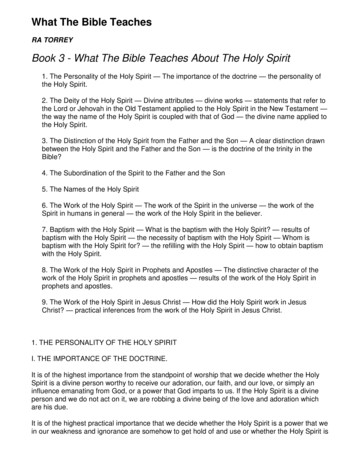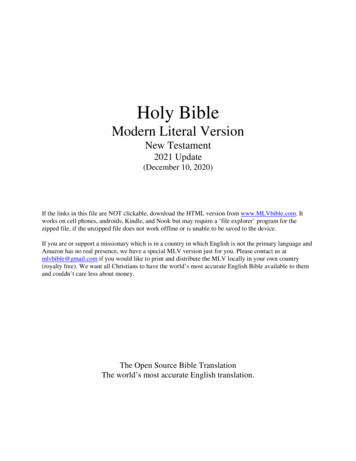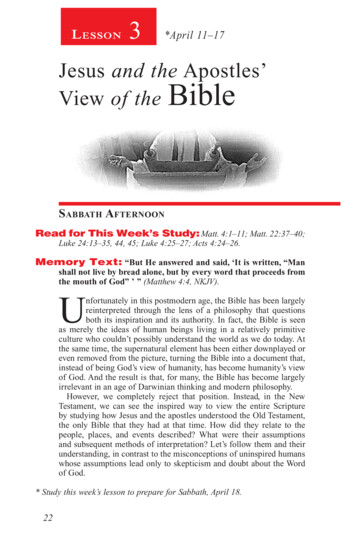
Transcription
What The Bible TeachesRA TORREYBook 3 - What The Bible Teaches About The Holy Spirit1. The Personality of the Holy Spirit — The importance of the doctrine — the personality ofthe Holy Spirit.2. The Deity of the Holy Spirit — Divine attributes — divine works — statements that refer tothe Lord or Jehovah in the Old Testament applied to the Holy Spirit in the New Testament —the way the name of the Holy Spirit is coupled with that of God — the divine name applied tothe Holy Spirit.3. The Distinction of the Holy Spirit from the Father and the Son — A clear distinction drawnbetween the Holy Spirit and the Father and the Son — is the doctrine of the trinity in theBible?4. The Subordination of the Spirit to the Father and the Son5. The Names of the Holy Spirit6. The Work of the Holy Spirit — The work of the Spirit in the universe — the work of theSpirit in humans in general — the work of the Holy Spirit in the believer.7. Baptism with the Holy Spirit — What is the baptism with the Holy Spirit? — results ofbaptism with the Holy Spirit — the necessity of baptism with the Holy Spirit — Whom isbaptism with the Holy Spirit for? — the refilling with the Holy Spirit — how to obtain baptismwith the Holy Spirit.8. The Work of the Holy Spirit in Prophets and Apostles — The distinctive character of thework of the Holy Spirit in prophets and apostles — results of the work of the Holy Spirit inprophets and apostles.9. The Work of the Holy Spirit in Jesus Christ — How did the Holy Spirit work in JesusChrist? — practical inferences from the work of the Holy Spirit in Jesus Christ.1. THE PERSONALITY OF THE HOLY SPIRITI. THE IMPORTANCE OF THE DOCTRINE.It is of the highest importance from the standpoint of worship that we decide whether the HolySpirit is a divine person worthy to receive our adoration, our faith, and our love, or simply aninfluence emanating from God, or a power that God imparts to us. If the Holy Spirit is a divineperson and we do not act on it, we are robbing a divine being of the love and adoration whichare his due.It is of the highest practical importance that we decide whether the Holy Spirit is a power that wein our weakness and ignorance are somehow to get hold of and use or whether the Holy Spirit is
a personal being infinitely wise, infinitely holy, infinitely tender, who is to get hold of us and useus.The one conception is heathenish, the other Christian. The one conception leads to selfhumiliation, self-emptying, and self-renunciation; the other conception leads to self-exaltation.It is of the highest experiential importance that we know the Holy Spirit as a person. Many cantestify to the blessing that came into their lives when they came to know the Holy Spirit notmerely as a gracious influence (emanating, it is true, from God), but as an ever-present lovingfriend and helper.II. THE PERSONALITY OF THE HOLY SPIRIT. THE USE OF PERSONAL PRONOUNS John15:26 — -"But when the Comforter is come, whom I will send unto you from the Father, even theSpirit of truth, which proceedeth from the Father, He shall testify of me. John 16:7-8 —"Nevertheless I tell you the truth; It is expedient for you that I go away: for if I go not away, theComforter will not come unto you; but if I depart, I will send Him unto you. And when he is come,He will reprove the world of sin, and of righteousness, and of judgment." John 16:13-14" Howbeitwhen He, the spirit of truth, is come, he will guide you into all truth: for he will not speak ofHimself: but whatsoever he shall hear, that shall he speak: and he will show you things to come.He shall glorify me: for he shall receive of mine, and shall show it unto you."First Proposition: Various pronouns that clearly imply personality are repeatedly used of the HolySpirit.The use of these pronouns is remarkable considering that in the Greek language the word for"spirit" is a neuter noun, and according to Greek usage, the pronouns that refer to spirit shouldbe neuter. Yet in numerous instances a masculine pronoun is used, thus bringing out verystrikingly how the Bible idea of the personality of the Holy Spirit dominates grammaticalconstruction. There are instances, of course, where the natural grammatical usage is followedand a neuter pronoun used ( Romans 8:16,26). But in many instances this construction is setaside and the masculine personal pronoun used to refer to the neuter noun.PERSONAL CHARACTERISTICS ASCRIBED TO THE HOLY SPIRIT1 Corinthians 2:10-11 — "For God hath revealed them unto us by his Spirit: for the Spiritsearcheth all things, yea, the deep things of God. For what man knoweth the things of a man,save the spirit of man which is in him? even so the things of God knoweth no man, but the Spiritof God."Knowledge is ascribed to the Holy Spirit. 1 Corinthians 12:11 — "But all these worketh that oneand the self:same Spirit, dividing to every man severally as he will."Will is ascribed to the Spirit. Romans 8:27 — "And he that searcheth the hearts knoweth what isin the mind of the Spirit, because he maketh intercession for the saints according to the will ofGod."Mind is ascribed to the Holy Spirit. The word here translated "mind" is a comprehensive wordincluding the ideas of thought, feeling and purpose. (Compare to Romans 8:7 — "Because thecarnal mind is enmity against God; for it is not subject to the law of God, neither indeed can be.")Romans 15:30 — "Now I beseech you, brethren, for the Lord Jesus Christ's sake, and for thelove of the Spirit, that ye strive together with me in your prayers to God for me."
Love is ascribed to the Holy Spirit. Nehemiah 9:20 — "Thou gavest also thy good Spirit toinstruct them, and withheldest not thy manna from their mouth, and gavest them water for theirthirst."Intelligence and goodness are ascribed to the Holy Spirit. Note that this passage is from the OldTestament, where the truth of the personality of the Holy Spirit is not as fully developed as in theNew Testament. Ephesians 4:30 — "And grieve not the Holy Spirit of God, whereby ye aresealed unto the day of redemption."Grief is ascribed to the Holy Spirit. The Holy Spirit thinks, feels, purposes, knows, wills, loves,grieves.Second Proposition: Many characteristics that only a person can possess are ascribed to theHoly Spirit.PERSONAL ACTS ASCRIBED TO THE HOLY SPIRIT1 Corinthians 2:10 — "But God hath revealed them unto us by his Spirit: for the Spirit searchethall things, yea, the deep things of God."The Holy Spirit searches the deep things of God. Revelation 2:7 — "He that hath an ear, let himhear what the Spirit saith unto the churches: To him that overcometh will I give to eat of the treeof life, which is in the midst of the paradise of God."The Holy Spirit speaks. Galatians 4:6 — "And because ye are sons. God hath sent forth theSpirit of his Son into your hearts, crying, Abba, Father."The Holy Spirit cries out. Romans 8:26, R.V. — "And in like manner the Spirit also helpeth ourinfirmity: for we know not how to pray as we ought; but the Spirit himself maketh intercession forus with groanings which can not be uttered."The Holy Spirit intercedes. John 15:26 — "But when the Comforter is come, whom I will sendunto you from the Father, even the Spirit of truth, which proceedeth from the Father, he shalltestify of me."The Holy Spirit testifies. John 14:26 — "But the Comforter, which is the Holy Ghost, whom theFather will send in my name, he shall teach you all things, and bring all things to yourremembrance, whatsoever I have said unto you." (Compare John 16:12-14 "I have yet manythings to say unto you, but ye cannot bear them now. Howbeit when he, the Spirit of truth iscome, he will guide you into all truth: for he shall not speak of himself; but whatsoever he shallhear, that shall he speak: and he will show you things to come. He shall glorify me: for he shallreceive of mine, and shall show it unto you." Nehemiah 9:20 — "Thou gavest also thy good Spiritto instruct them, and withheldest not thy manna from their mouth, and gavest them water fortheir thirst.") The Holy Spirit teaches all the truth. Romans 8:14 "For as many as are led by theSpirit of God, they are the sons of God."The Holy Spirit leads, or directs believers in what to do. Acts 16:6-7 — "Now when they hadgone throughout Phrygia and the region of Galatia, and were forbidden of the Holy Ghost topreach the word in Asia, After they were come to Mysia, they assayed to go into Bithynia; but theSpirit suffered them not."The Holy Spirit commands. Acts 13:2 — "As they ministered to the Lord, and fasted, the HolyGhost said, Separate me Barnabas and Saul for the work whereunto I have called them." Acts
20:28 — "Take heed therefore unto yourselves, and to all the flock, over the which the HolyGhost hath made you overseers, to feed the church of God, which he hath purchased with hisown blood."The Holy Spirit calls us to work and appoints our role or office. John 15:26 — -"But when theComforter is come, whom I will send unto you from the Father, even the Spirit of truth, whichproceedeth from the Father, he shall testify of me."The Holy Spirit goes forth upon missions to which He is sent.Third Proposition: Many acts that only a person can perform are ascribed to the Holy Spirit.PERSONAL OFFICEJohn 14:16-17 — "And I will pray the Father, and he shall give you another Comforter, that hemay abide with you forever; Even the Spirit of truth; whom the world cannot receive, because itseeth him not, neither knoweth him: but ye know him; for he dwelleth with you, and shall be inyou."It is the office of the Holy Spirit to be "another Comforter" (or paraclete) to take the place of theabsent Savior. Is it possible that Jesus Christ could use such language in speaking of animpersonal influence or power?Fourth Proposition: An office is predicated of the Holy Spirit that could only be predicated of aperson.PERSONAL TREATMENT ASCRIBED TO THE HOLY SPIRITIsaiah 63:10 R.V. — "But they rebelled, and grieved his holy spirit: therefore he was turned to betheir enemy, and himself fought against them."The Holy Spirit can be rebelled against and grieved, or offended. (Compare to Ephesians 4:30.)Hebrews 10:29 — "Of how much sorer punishment, suppose ye, shall he be thought worthy,who hath trodden under foot the Son of God, and hath counted the blood of the covenantwherewith he is sanctified, an unholy thing, and hath done despite unto the Spirit of grace."The Holy Spirit can perceive when people treat it with despite. Acts 5:3 — "But Peter said,Ananias, why hath Satan filled thine heart to lie to the Holy Ghost, and to keep back part of theprice of the land?"The Holy Spirit can be lied to. Matthew 12:31-32 — "Wherefore I say unto you, All manner of sinand blasphemy shall be forgiven unto men: but the blasphemy against the Holy Ghost shall notbe forgiven unto men. And whosoever speaketh a word against the Son of man, it shall beforgiven him: but whosoever speaketh against the Holy Ghost, it shall not be forgiven him,neither in this world, neither in the world to come."The Holy Spirit can be blasphemed against.Fifth Proposition: A treatment is predicated of the Holy Spirit that could only be predicated of aperson.Concluding Proposition: The Holy Spirit is a person.
Theoretically we may believe this. Do we in our real thought of Him, or in our practical attitudetoward Him, treat Him as a person? Do we regard Him as indeed as real a person as JesusChrist — as loving, wise and strong, as worthy of our confidence and love and surrender, as He?He came to be to the disciples, and to us, what Christ had been to them during the days of Hispersonal companionship with them ( John 14:16-17). Do we know "the communion or fellowship"of the Holy Ghost ( Corinthians 13:14)?2. THE DEITY OF THE HOLY SPIRITI. DIVINE ATTRIBUTES. Hebrews 9:14 — -"How much more shall the blood of Christ, whothrough the eternal Spirit offered himself without spot to God, purge your conscience from deadworks to serve the living God?"First Proposition: The Holy Spirit is eternal. 19D907 Psalm 139:7-10 — "Whither shall I gofrom thy Spirit? or whither shall I flee from thy presence? If I ascend up into heaven, thou artthere: if I make my bed in hell, behold, thou art there. If I take the wings of the morning, anddwell in the uttermost parts of the sea; even there shall thy hand lead me, and thy right handshall hold me."Second Proposition: The Holy Spirit is omnipresent. Luke 1:35 — "And the angel answered andsaid unto her, The Holy Ghost shall come upon thee, and the power of the highest shallovershadow thee: therefore also that holy thing which shall be born of thee shall be called theSon of God."Third Proposition: The Holy Spirit is omnipotent. 1 Corinthians 2:10-11 — "For God hathrevealed them unto us by his Spirit: for the Spirit searcheth all things, yea, the deep things ofGod. For what man knoweth the things of a man, save the spirit of man which is in him? even sothe things of God knoweth no man, but the Spirit of God." John 14:26 — "But the Comforter,which is the Holy Ghost, whom the Father will send in my name, he shall teach you all things,and bring all things to your remembrance, whatsoever I have said unto you." John 16:12-13 — "Ihave yet many things to say unto you, but ye can not bear them now. Howbeit when he, theSpirit of truth, is come, he will guide you into all truth: for he shall not speak of himself; butwhatsoever he shall hear, that shall he speak: and he will show you things to come."Fourth Proposition: The Holy Spirit is omniscient.Concluding Proposition: Each of the four distinctly divine attributes is ascribed to the Holy Spirit.II. DIVINE WORKS. Job 33:4 "The Spirit of God hath made me, and the breath of the Almightyhath given me life." 19A430 Psalm 104:30 — "Thou sendest forth thy spirit, they are created:and thou renewest the face of the earth."First Proposition: Creation is ascribed to the Holy Spirit. John 6:63 — "It is the Spirit thatquickeneth; the flesh profiteth nothing: the words that I speak unto you, they are spirit, and theyare life." Romans 8:11 — "But if the Spirit of him that raised up Jesus from the dead dwell in you,he that raised up Christ from the dead shall also quicken your mortal bodies by his Spirit thatdwelleth in you." Genesis 2:7 — "And the LORD God formed man of the dust of the ground, andbreathed into his nostrils the breath of life; and man became a living soul.Second Proposition: The impartation of life is ascribed to the Holy Spirit. 2 Peter 1:21 R.V. —"For no prophecy ever came by the will of man: but men spake from God, being moved by theHoly Ghost." 2 Samuel 23:2-3 — "The Spirit of the LORD spake by me, and his word was in my
tongue. The God of Israel said, The Rock of Israel spake to me, He that ruleth over men must bejust, ruling in the fear of God."Third Proposition: The Bible ascribes authorship of divine prophecies to the Holy Spirit.Concluding Proposition: The Bible ascribes three distinctively divine works to the Holy Spirit.III. STATEMENTS THAT REFER TO THE LORD OR JEHOVAH IN THE OLD TESTAMENTAPPLIED TO THE HOLY SPIRIT IN THE NEW TESTAMENT. Isaiah 6:8-10 — "Also I heard thevoice of the LORD, saying, whom shall I send, and who will go for us? Then said I, Here am I;send me. And he said, Go, and tell this people, hear ye indeed, but understand not; and see yeindeed, but perceive not. Make the heart of this people fat, and make their ears heavy, and shuttheir eyes; lest they see with their eyes and hear with their ears, and understand with their heart,and convert, and be healed." (Compare to Acts 28:25-27 — "And when they agreed not amongthemselves, they departed, after that Paul had spoken one word.Well spake the Holy Ghost by Esaias the prophet unto our fathers, saying, Go unto this people,and say, Hearing ye shall hear, and shall not understand; and seeing ye shall see, and notperceive: For the heart of this people is waxed gross, and their ears are dull of hearing, and theireyes have they closed; lest they should see with their eyes, and hear with their ears, andunderstand with their hearts and should be converted, and I should heal them.") This samepassage is applied to Jesus Christ. Could it be that in the threefold "holy" of the seraphic cry inIsaiah 6:3, "And one cried unto another, and said, Holy, holy, holy, is the LORD of hosts: thewhole earth is full of his glory," we have a hint of the triune personality of the Jehovah of Hostsand hence the propriety of the threefold application of the vision? Exodus 16:7 — "And in themorning, then ye shall see the glory of the LORD; and what are we, that ye murmur against us?"(Compare Hebrews 3:7-9 — "Wherefore as the Holy Ghost saith, To-day if ye will hear his voice,harden not your hearts, as in the provocation, in the day of temptation in the wilderness: Whenyour fathers tempted me, proved me, and saw my works forty years.") See also Psalm 95:8-11.Proposition: Statements which in the Old Testament distinctly name the Lord, God, or Jehovahas their subject are applied to the Holy Spirit in the New Testament; thus, the Holy Spiritoccupies the position of deity in the New Testament thought.IV. THE WAY IN WHICH THE NAME OF THE HOLY SPIRIT IS COUPLED WITH THAT OFGOD. 1 Corinthians 12:4-6 — "Now there are diversities of gifts, but the same Spirit. And thereare differences of administrations, but the same Lord. And there are diversities of operations, butit is the same God which worketh all in all." Matthew 28:19 — "Go ye therefore, and teach allnations, baptizing them in the name of the Father, and of the Son, and of the Holy Ghost." 2Corinthians 13-14 "The grace of the Lord Jesus Christ, and the love of God, and the communionof the Holy Ghost, be with you all. Amen."Proposition: The name of the Holy Spirit is coupled with the name of God in a way that it wouldbe impossible for a reverent and thoughtful mind to couple the name of any finite being with thatof the deity.V. THE DIVINE NAME APPLIED TO THE HOLY SPIRIT. Acts 5:3-4 "But Peter said, Ananias,why hath Satan filled thine heart to lie to the Holy Ghost, and to keep back part of the price ofthe land? While it remained, was it not thine own? and after it was sold, was it not in thine ownpower? why hast thou conceived this thing in thine heart? thou hast not lied unto men, but untoGod."Proposition: The Holy Spirit is called God.
By the ascription of all the distinctively divine attributes and several distinctively divineoperations; by referring statements that in the Old Testament distinctly name Jehovah, the Lord,or God as their subject to the Holy Spirit in the New Testament; by coupling the name of theHoly Spirit with the name of God in a way that it would be impossible to couple that of any finitebeing with that of the deity; by calling the Holy Spirit "God" — in all these unmistakable ways,God in His word distinctly proclaims the Holy Spirit is a divine person.3. THE DISTINCTION OF THE HOLY SPIRIT FROM THE FATHER AND THE SON Luke 3:2122 — "Now when all the people were baptized, it came to pass, that Jesus also being baptized,and praying, the heaven was opened, and the Holy Ghost descended in a bodily shape like adove upon him, and a voice came from heaven, which said, Thou art my beloved Son; in thee Iam well pleased."First Proposition: A clear distinction is drawn between Jesus Christ who was on the earth, theFather who spoke to him from heaven, and the Holy Spirit who descended in a bodily form as adove upon Jesus. Matthew 28:19 — "Go ye therefore, and teach all nations, baptizing them inthe name of the Father, and of the Son, and of the Holy Ghost."Second Proposition: A clear distinction is drawn between "the name of the Father" and "of theSon" and "of the Holy Ghost." John 14:16 — -"And I will pray the Father, and he shall give youanother Comforter, that he may abide with you forever."Third Proposition: A clear distinction is drawn between the Son who prays, the Father to whomHe prays, and the "another Comforter" who is given in answer to the prayer. John 16:7 —"Nevertheless I tell you the truth: it is expedient for you that I go away: for if I go not away, theComforter will not come unto you; but if I depart, I will send him unto you."Fourth Proposition: A clear distinction is drawn between Jesus who goes away and the HolySpirit who comes to take His place. Acts 2:33 — "Therefore being by the right hand of Godexalted, and having received of the Father the promise of the Holy Ghost, he hath shed forththis, which ye now see and hear."Fifth Proposition: A clear distinction is drawn between the Son, who is exalted to the right handof the Father, and the Father Himself, and the Holy Spirit, who the Son receives from the Fatherand sheds upon the church.Concluding Proposition: Again and again the Bible draws the clearest possible distinctionbetween the Holy Spirit and the Father and the Son.They are separate personalities, having mutual relations to one another, acting upon oneanother, speaking of or to one another, and they apply the pronouns of the second and thirdpersons to one another.It has been said that the doctrine of the Trinity is not taught in the Bible. It is true that it is notdirectly taught; but the doctrine of the Trinity is the putting together of truths that are taught. It isclearly taught in the Bible that there is but one God. It is also clearly taught that there are threedivine per-sons — the Father, the Son, and the Holy Spirit.4. THE SUBORDINATION OF THE SPIRIT TO THE FATHER AND THE SON John 14:26 — "But the Comforter, which is the Holy Ghost, whom the Father will send in my name, he shallteach you all things, and bring all things to your remembrance, whatsoever I have said untoyou." John 15:26 — -"But when the Comforter is come, whom I will send unto you from theFather, even the Spirit of truth, which proceedeth from the Father, he shall testify of me."
First Proposition: The Holy Spirit is sent by the Father and also by the Son.Elsewhere we are taught that Jesus Christ was sent by the Father ( John 6:29; 8:29, 42).Romans 8:9 — "But ye are not in the flesh, but in the Spirit, if so be that the Spirit of God dwell inyou. Now if any man have not the Spirit of Christ, he is none of his."Second Proposition: The Holy Spirit is called "the Spirit of God" and "the Spirit of Christ.'(Compare Acts 16:7 R.V. — "And when they were come over against Mysia, they assayed to gointo Bithynia; and the spirit of Jesus suffered them not.") John 16:13 R.V. — "Howbeit when he,the Spirit of truth, is come, he shall guide you into all the truth: for he shall not speak fromhimself; but what things soever he shall hear, these shall he speak: and he shall declare untoyou the things that are to come."Third Proposition: The Holy Spirit speaks not from Himself but speaks the things which Hebears.In a similar way Jesus said of Himself, "my teaching is not mine, but His that sent Me" ( John7:16, 8:26, 40). John 16:14 — "He shall glorify me: for he shall receive of mine, and shall show itunto you."Fourth Proposition: It is the work of the Holy Spirit to glorify Christ.In a similar way Christ sought not His own glory but the glory of Him that sent Him ( John 7:18).Concluding Proposition: The Holy Spirit in His present work is subordinated to the Father and tothe Son.We shall see later that in his earthly life Jesus lived and taught and worked in the power of theHoly Spirit.5. THE NAMES OF THE HOLY SPIRIT 1 Corinthians 2:10, R.V. — "But unto us God revealedthem through the Spirit: for the Spirit searcheth all things, yea, the deep things of God." "TheSpirit.' The word means "breath" or "wind." Both thoughts are in the word as applied to the HolySpirit. ( John 20:22 — "And when he had said this, he breathed on them, and saith unto them,Receive ye the Holy Ghost." Genesis 2:7 — "And the LORD God formed man of the dust of theground, and breathed into his nostrils the breath of life; and man became a living soul.")Compare 19A430 Psalm 104:30 — "Thou sendest forth thy spirit, they are created: and thourenewest the face of the earth," and Job 33:4 "The Spirit of God hath made me, and the breathof the Almighty hath given me life." Taken together, these passages show the idea of the Spiritas the breath of Christ and of God.In John 3:6-8 ("That which is born of the flesh is flesh; and that which is born of the Spirit isspirit. Marvel not that I said unto thee, Ye must be born again. The wind bloweth where it listeth,and thou hearest the sound thereof, but canst not tell whence it cometh, and whither it goeth: sois every one that is born of the Spirit"), we have the idea of the Spirit as the wind. The fullsignificance of this name as applied to the Holy Spirit may be beyond us to fathom, but thismuch seems clear: 1. The Spirit is the outbreathing of God, His life going forth to quicken.Possibly we should note the fact that the breath is itself the vital principle, and some havethought that the Spirit is therefore the inmost life of God. 2. The Spirit, like the wind, is:Sovereign. "Bloweth where it listeth" ( John 3:8). (Compare Corinthians 12:11 — "But all theseworketh that one and the selfsame Spirit, dividing to every man severally as he will.") Invisible."Thou hearest the sound thereof' ( John 3:8).
Inscrutable. "Thou knowest not whence it cometh and whither it goeth" ( John 3:8).Indispensable. Without air in motion there is not life. ( John 3:5 — "Jesus answered, Verily,verily, I say unto you, Except a man be born of water and of the Spirit, he cannot enter into thekingdom of God.") Lifegiving. Ezekiel 37:8-10 — "And when I beheld, lo, the sinews and theflesh came up upon them, and the skin covered them above: but there was no breath in them.Then said he unto me, Prophesy unto the wind, prophesy, son of man, and say to the wind,Thus saith the Lord God; Come from the four winds, O breath, and breathe upon these slain,that they may live. So I prophesied as he commanded me, and the breath came into them, andthey lived, and stood up upon their feet, an exceeding great army." (Compare John 3:5.)Much at least of the difficulty in John 3:5 would disappear if we would remember that "spirit"means "wind" and translate literally "Except a man be born of water and wind, he cannot enterinto the Kingdom of God" (i.e., except a man be born of the cleansing and quickening power ofthe Spirit or of the cleansing word — Compare John 15:3, Ephesians 5:26, James 1:18, 1 Peter1:23).Irresistible. (Compare Acts 1:8 — "But ye shall receive power, after that he Holy Ghost is comeupon you: and ye shall be witnesses unto me both in Jerusalem, and in all Judea, and inSamaria, and unto the uttermost part of the earth," and Acts 6:10 — "And they were not able toresist the wisdom and the spirit by which he spake.") A man filled with the Holy Ghost istransformed into a cyclone. 1 Corinthians 3:16 — "Know ye not that ye are the temple of God,and that the Spirit of God dwelleth in you?" "The Spirit of God.' This name includes the sameessential thought as the former, but emphasizes His divine origin, character and power. Isaiah11:2 — "And the Spirit of the LORD shall rest upon him, the spirit of wisdom and understanding,the spirit of counsel and might, the spirit of knowledge and of the fear of the LORD." (CompareIsaiah 63:14.) "The Spirit of Jehovah." Isaiah 61:1 — "The Spirit of the Lord God is upon me;because the LORD hath anointed me to preach good tidings unto the meek; he hath sent me tobind up the brokenhearted, to proclaim liberty to the captives, and the opening of the prison tothem that are bound." "The Spirit of the Lord God," or rather "Lord Jehovah." This is still moreemphatic. 2 Corinthians 3:3 — "Forasmuch as ye are manifestly declared to be the epistle ofChrist ministered by us, written not with ink, but with the Spirit of the living God; not in tables ofstone, but in fleshly tables of the heart." "The Spirit of the Living God.' Romans 8:9 — "But yeare not in the flesh, but in the Spirit if so be that the Spirit of God dwell in you. Now if any manhave not the Spirit of Christ, he is none of his." "The Spirit of Christ.' This name brings out therelation of the Spirit to Christ as well as to the Father. (Compare to Acts 2:33 — "Thereforebeing by the right hand of God exalted, and having received of the Father the promise of theHoly Ghost, he hath shed forth this, which ye now see and hear.") Galatians 4:6 — "Andbecause ye are sons, God hath sent forth the Spirit of his Son into your hearts crying, Abba,Father." "The Spirit of His Son.' This name is given to the Holy Spirit in especial connection withHis testifying to the sonship of the believer. It is "the Spirit of His Son" who testifies to oursonship. Philippians 1:19 — "For I know that this shall turn to my salvation through your prayer,and the supply of the Spirit of Jesus Christ." "The Spirit of Jesus Christ.' The Spirit is not merelythe spirit of the eternal word, but the spirit of the word incarnate, Jesus Christ. It is the manJesus exalted to the right hand of the Father who receives and sends the Spirit. Acts 2:32-33 —"This Jesus hath God raised up, whereof we all are witnesses. Therefore, being by the righthand of God exalted, and having received of the Father the promise of the Holy Ghost, he hathshed forth this, which ye now see and hear." Acts 16:7 R.V. — "And when they were come overagainst Mysia, they assayed to go into Bithynia: and the Spirit of Jesus suffered them not."(Compare to verse 6 — -"And they went through the region of Phrygia and Galatia, having beenforbidden of the Holy Ghost to speak the word in Asia.") "The Spirit of Jesus." The relation of theSpirit to the man Jesus is still more clear here. Luke 11:13 — -"If ye then, being evil, know howto give good gifts unto your children; how much more shall your heavenly Father give the Holy
Spirit to them that ask him?" "The Holy Spirit." This name emphasizes the essential moralcharacter of the Spirit. He is holy in Himself. He imparts h
RA TORREY Book 3 - What The Bible Teaches About The Holy Spirit . The Work of the Holy Spirit — The work of the Spirit in the universe — the work of the . It is of the highest importance from the standpoint of worship that we decide whether the Holy Spirit is a divine person worthy











